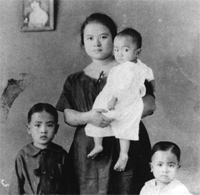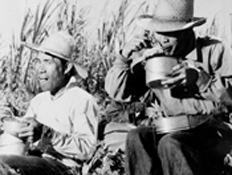


SAKADAS AND SOLDIERS:
HAWAII FILIPINOS IN WORLD WAR I
Filipinos Encounter Racism
The Service Registration Act and the War Department federalized and readied the Guard regiments for active duty abroad. Sugar planters recognized the draft would affect their labor pool, so Hawai'i's English language press began mounting a strong attack against Filipino participation in the National Guard. To counter the depletion of their labor pool, sugar planters advocated for the Guard's non-overseas deployment, and they began promoting alleged ideas of Filipinos’ unfitness for military service and lack of discipline.

Contrary to Judge Charles Clemon’s earlier 1916 decision permitting citizenship, U.S. District Court Attorney Horace W. Vaughn issued an opposing opinion based on the grounds that Filipinos were not "free white citizens…," as the law required. Public opinion in Hawai'i sided with Judge Vaughn because of the political consequences of Filipino naturalization.
In 1916 there were 15,220 Filipinos, mostly males of voting age; by comparison, there were 17,699 registered Hawaii voters. If all Filipinos were naturalized, the fear was Filipinos, who were considered an "inferior race," would comprise almost half of Hawaii’s voters. Even a native Hawaiian warned, "in the course of five years an inferior race will have the majority in the elections."
Judge Vaughn’s ruling encouraged discrimination against Filipinos and prompted Hawaii officials to dismiss Filipinos from government work and construction projects. Hawaii Filipinos bitterly pointed out the unfair nature of their treatment. In the Philippines, Filipinos were solicited to enlist in the Philippine National Guard, serve as regular American Army soldiers in the Philippine Scouts and the Philippine Constabulary and, furthermore, were eligible to work as crew members on the US transports and battleships. Yet, in Hawaii, Filipino had now become ineligible for guardsmen duties and were barred from government projects and civilian employment in the naval bases.
HOME |
Filipino-American
Historical Society of Hawaii
|
Help
Exhibits
| Publications
|
Collections
| Student/Teachers
Photographs
& Maps | Biographies & Oral Histories
| Community Organizations
WWI
Veterans | Centennial
Commission (2006)
Copyright © 2006 by the Filipino-American Historical Society of Hawaii. Updated 2020.